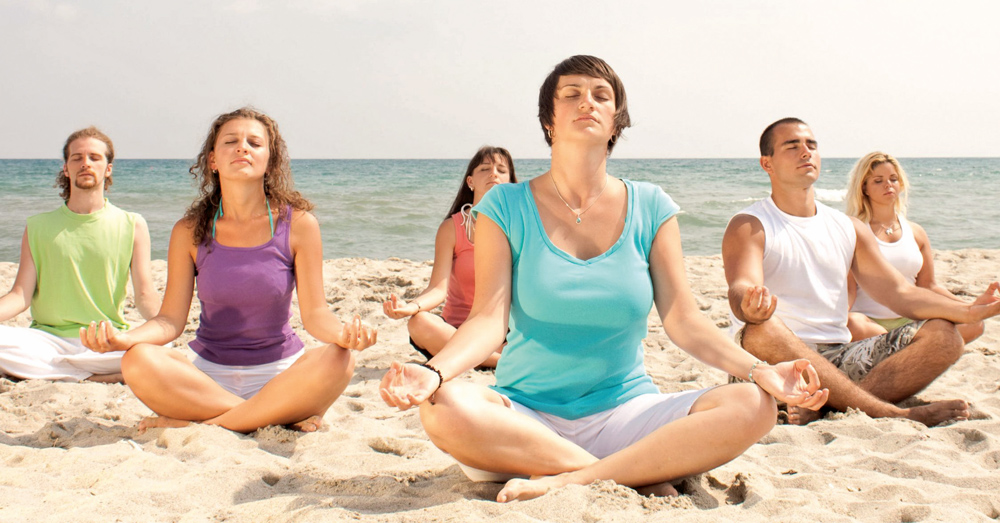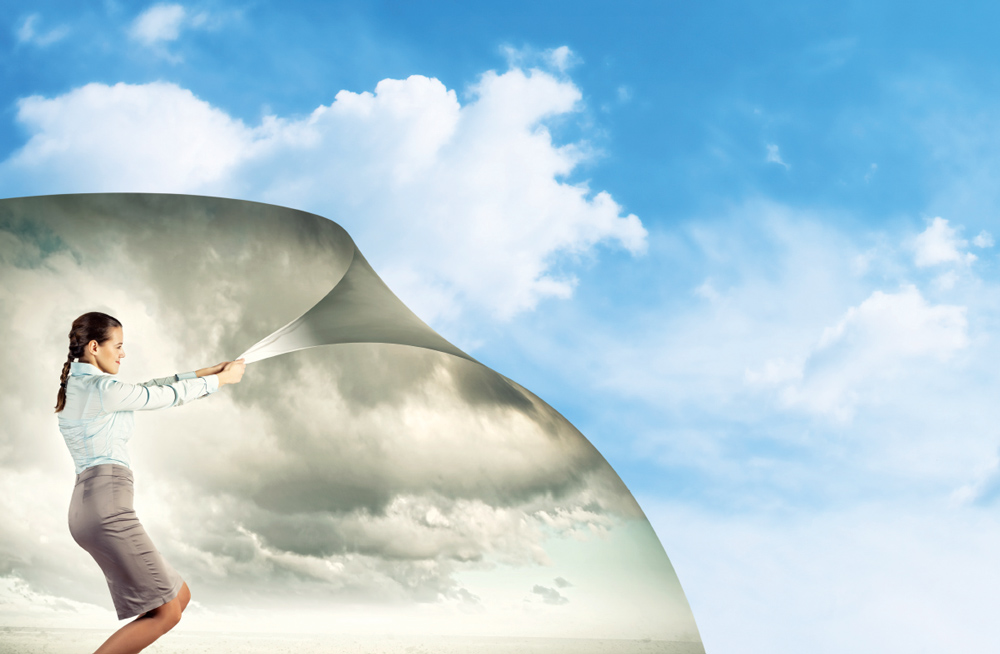When we look at Planet Earth from the Moon, as astronaut Edgar Mitchell shared with us, it is just a small round ball. As the Apollo 14 moved closer and the world became larger, Mitchell’s life changed forever. From exploring the far reaches of outer space, he began to seek a deeper meaning for his experience and turned to explore his inner world, which came to include meditation.
In our own, yet similar way, we both realized the importance of meditation early in our lives in response to the need to find meaning in the midst of chaos. Ed was in his twenties; Deb was just fifteen. but even at that young age, we had already realized that we needed a deeper way of understanding the world.
More recently, we wondered what could bring greater awareness, kindness, and compassion to a world at a time of political upheaval and economic downturn. Could something as simple and understated as meditation have an effect on politics, business, or even the environment? Could it make a big enough change in consciousness to transform the way we see ourselves, each other, and our world? and what change could happen if something so simple were to become a global movement?
Perhaps we will soon find out. in the state of ohio, Congressman Tim Ryan, the author of the best-selling book Mindful Nation, is dedicated to bringing mindfulness meditation to Congress, schools, and the forces. Tim explains how through meditation we get to see our blind spots and weaknesses, and to develop compassion for ourselves. He sees the importance of how this improves our ability to see and act clearly.
And just as science propelled astronaut Edgar Mitchell to walk on the moon, so science is now proving that meditation is a genuine way to generate peace by reducing potentially harmful emotions, such as fear and anger. We usually think of such negative mind states as a fixed part of life, but they don’t need to be. Many adverse emotions arise from the emphasis we place on success and achievement, which is a left-brain activity. during meditation, we engage the right side of the brain, which encourages us to communicate in a more positive and caring way.
Neuro scientist Richie Davidson is researching the effect meditation has on the brain and emphasizes this point, “The effect of meditation on the circuitry in the brain clearly underscores the possibility of radical change in a way that could transform anger and fear. There is certainly evidence to show that meditation practices designed to cultivate compassion and loving kindness change the brain in many positive ways.”
And yet, if meditation is now so available and well known, why is it not already an integral part of everyone’s lives? health reports say how good it is as a way to cope with stress, so why do we ignore it or find excuses not to do it? and why do we think of it as a waste of time when all the research tells us it is of such immense value?

We are not who we think we are
Perhaps you have heard this story about a frog and a scorpion:
One day a frog was sitting happily by the side of the river when a scorpion came along.
“Oh Mr. Frog,” said the scorpion, “I need to get to the other side of the river to be with my family. Will you please carry me across?”
“But Mr. Scorpion, if I do that, then you will sting me!” replied the frog, somewhat aghast at the request.
“no, I won’t” said the scorpion.
“do you promise?” asked a rather doubtful frog.
“I really promise—I will not sting you,” said the scorpion, as convincingly as he could.
“do you really, really promise?” asked a still-dubious frog. “Yes, I really promise,” replied the scorpion, very sincerely. “okay,” the frog said reluctantly. “hop on.”
The scorpion climbed on top of the frog’s back and they set off. halfway across the river, the scorpion stung the frog. In horror the frog, unable to continue swimming and with both of them about to drown, finally manages to gasp, “please, Mr. Scorpion, just tell me one thing before we both go under. Just tell me why, when you promised you would not, why oh why did you sting me?”
“Because it’s my nature,” replied the scorpion.
With no intention of being derogatory to scorpions, this story shows how the nature of the scorpion appears unchangeable and fixed. it has no choice regarding its behavior because it is a scorpion; that’s simply the way it is. And many of us think we are just like the scorpion. We believe we cannot change, that we are just the way we are and that’s that—this is who I am and I won’t change—we are even fearful of change. but while a scorpion is not necessarily able to act any differently, we can. We do have choices. We do not have to be the way we think we are; we can actually be and act differently.
IN THE NINETEENTH CENTURY, PHILOSOPHER WILLIAM JAMES SAID:
“THE GREAT REVOLUTION IN OUR GENERATION IS THE DISCOVERY THAT HUMAN BEINGS, BY CHANGING THE INNER ATTITUDES OF THEIR MINDS, CAN CHANGE THE OUTER ASPECTS OF THEIR LIVES.”
Dancing with the ego
And we do so long to have a better life, be different, to be happier than we are—the grass always seems to be so much greener elsewhere. So what is it that causes us to resist change?
Invariably it is our ego-mind, the most talked about yet least understood of all our human features. The ego gives us an overly strong sense of ourselves; it’s the “me-centered” part. This is neither good nor bad, except when self- obsession dominates our thoughts, feelings, and perceptions of life. a positive sense of self is healthy and gives us confidence and purpose, but a more negative and selfish aspect of the ego makes us unconcerned about others; it thrives on the idea of me-first and impels us to cry out, “What about me? What about my feelings?”
“I think i’m the most important being in the world,” says prof. robert Thurman in Be The Change. “but nobody else thinks it’s about me, time doesn’t think it’s about me, space doesn’t think it’s about me, the planet doesn’t think it’s about me. it doesn’t take much to get the message that it is actually not about me! but if somebody comes and steps on my toe or wants to take away my strawberries, then suddenly it is all about me again!”
By watching how we equate ourselves with images of whom we think we are, or with labels that reinforce that image and make us appear special—“i am a teacher, doctor, divorcee, recovering alcoholic”—so many manifestations of the ego appear before us. in the search for meaning we unconsciously hide behind our title, profession, or religion and become attached to the story the label creates, even introducing ourselves in terms of labels or only relating to others who identify themselves in the same way. Seeing through these veils of illusions and being willing to give up our story is no small step.
“There is such pressure to keep each of my identities, each of my labels intact,” writes Joan Tollifson in Bare-Bones Meditation: Waking Up from the Story of My Life. “Why do i feel as if no one really knows me until they know my story? Tremendous fear arises at the thought of losing my labels, and at the same time there is immense peace in living without them.”
The nature of the ego is to stay in control, and so the ego-mind does all it can to keep us in the realm of self- centered me-ness. it is a remarkably good shape shifter, taking on any number of disguises and appears in many varied forms, but its main job is to keep us distracted. For instance, it can make us believe we are the cleverest, the best informed and most important, as easily as it can make us feel unworthy, unlovable, or not good enough to be happy. and it is this sense of self that is the root cause of so much confusion and distress, both in our own lives and in the world, as in its name wars are fought, families split, and friends forgotten.
Self-centeredness and selfishness, the hallmarks of the ego, affect not only our own lives and relationships but also influence the way we behave in the world. There is no limit to the damage a strong ego can do, from the arrogant conviction that its own opinions are the only right ones and everyone should be made to believe in them, to wielding and abusing power at the expense of other people’s lives or liberties.

The ego also makes us believe that we are the dust on the mirror and could never be so beautiful as the radiant reflection beneath the surface. Yet how extraordinary to believe that we cannot be free when freedom is our true nature! When we become aware that such self-centeredness does not lead to happiness and we yearn for something more authentic, when we realize that the pit of meaninglessness and emptiness inside is never truly satiated no matter how much we feed it, or when we have just had enough of chaos and suffering, then the longing for change arises.
Hypothetically, all we need to do is let go of the habitual focus on “me,” which is our sense of separateness, our need for distinction, the grasping and clinging to our story. Then we can retire the ego, the false sense of who we think we are. but this is far easier said than done, as the ego nature is subtle and tricky, always making us think it knows what is best but this is a false sense of knowing.
In India, the ego is represented by a coconut, as this is the hardest nut to crack. Traditionally, the coconut is offered to the guru or teacher as a sign of the student’s willingness to surrender his or her ego and let go of self-obsession. Such a symbolic gesture shows that the ego is considered to be a great obstacle on the spiritual path and an even greater impediment to developing true kindness and compassion.

Embracing change
Mahatma Gandhi famously said, “You must be the change you want to see in the world.” In other words, change has to start within ourselves; we cannot expect the world to change if we do not. if we want to have more love in our lives, we must become more loving; if we genuinely want to end war and to bring real and peaceful change to the world, we must start by ending the war within ourselves.
Emerging from three years in the Auschwitz concentration camp, psychiatrist Victor Frankl said that after his imprisonment and the destruction of his family, he had been left with only “the last of the human freedoms, to choose one’s attitude in any given set of circumstances, to choose one’s own way.” This is the choice that each one of us has—a choice in how we live our lives, how we care for each other, and how we treat our world. When we open to transformation within ourselves, so then society also transforms; every change that each individual makes creates a chain reaction that is beneficial to all. instead of focusing on the problem we can start to live the solution.
Which brings us back to the importance of contemplation and meditation. Without such a practice of self-reflection we are subject to the ego’s every whim and have no way of putting a brake on its demands. Meditation, on the other hand, gives us the space to see ourselves clearly and objectively, a place from which we can witness our own behavior and reduce the ego’s influence.
Instead of thinking that we have to somehow eradicate or annihilate the ego, through meditation we become less engaged in the details of our own story and the ego releases its grip. This doesn’t mean that we become powerless like a doormat and let people walk all over us. rather, we are able to communicate more openly and honestly, and to love more unconditionally. Where the ego makes us believe we are immutable and unchangeable, in truth our true nature is completely free, unbound and unfettered.
Integrating change
We were in India in 1986 when we first met the Dalai Lama, the spiritual and political leader of Tibet, winner of the nobel peace prize, and probably the world’s most famous meditator. Deb recalls, “We were waiting for our meeting in a room that led off a balcony at his residence, beyond which rose the himalayan Mountains resplendent in the morning sunshine. Ed wandered outside to enjoy the view. as he did so he saw a monk further along the balcony waving for us to come to him. We presumed this monk would bring us to our meeting. but as we came closer we realized that this simple and unpretentious man was the Dalai Lama himself.”
“Ed and I immediately began to prostrate on the floor, as this is the respected way of greeting such a revered teacher. but the Dalai Lama took our hands and made us stand, saying, ‘no, no. We are all equal here.’ at first, I thought, oh sure! You are the great Dalai Lama, spiritual leader to millions, and I’m just a student. how can we possibly be equal? but over the following months, I felt his words in the core of my being and experienced the true equality he was referring to—the equality of our shared humanness and, simultaneously, our shared heart.”
Meditation changes us. From being self-centered, we become other-centered, concerned about the welfare of all equally, rather than being focused on just ourselves. We become more acutely aware of how we treat ourselves, each other, and our world, and seek to become a positive presence rather than a negative one. Kindness and compassion emerge as a natural expression of who we are. by getting to know ourselves, discovering that we are more than we thought we were, and by connecting more deeply with our essential self, we find the resources, strength, and wisdom to not only make changes, but to become the change we so long for.

“Einstein said that we cannot solve the problems of the world from the level of thinking that we were at when we created them,” says author and change-maker Marianne Williamson in Be The Change. “i think a lot of people embrace this concept, while underestimating what it really means. a different level of thinking means a different level of thinking. it doesn’t mean just a different kind of thinking. it doesn’t mean a different emphasis in our thinking. it doesn’t mean a more loving kind of thinking. it means what he said, a different level of thinking, and to me that is what meditation brings.

“Meditation can change the world because meditation changes us. That’s the point. The world will not change until we change. The state of the world is a reflection of who we are. The state of the world is the effect; the state of consciousness of human beings is the cause. Mahatma Gandhi said the problem with the world is that humanity is not in its right mind and that is what meditation addresses: it returns us to our right mind. Until there is this evolution in consciousness we will stay locked in a fear-based perspective in which we continue to see ourselves as separate from each other, and in which we continue to think that we can do something to someone else and not reap the result ourselves.”
From reducing stress and illness, transforming anger, and encouraging kindness and forgiveness, to confronting environmental issues and problems at work, or diffusing violence worldwide, meditation brings greater understanding and compassion wherever the meditator goes. it is a journey, sometimes a roller coaster, sometimes a walk in a gentle glade, but always an adventure to be enjoyed!
 Ed and Deb Shapiro have been teaching and writing about meditation for over 25 years and are the co-creators of Revolutionary Mindfulness along with Brian Jones. They are the authors of Be The Change: How Meditation Can Transform You and The World, with forewords by The Dalai Lama and Prof. Robert Thurman – winner of the Nautilus Gold Book Award. They host a live radio show: Going Out Of Your Mind. www.edanddebshapiro.com
Ed and Deb Shapiro have been teaching and writing about meditation for over 25 years and are the co-creators of Revolutionary Mindfulness along with Brian Jones. They are the authors of Be The Change: How Meditation Can Transform You and The World, with forewords by The Dalai Lama and Prof. Robert Thurman – winner of the Nautilus Gold Book Award. They host a live radio show: Going Out Of Your Mind. www.edanddebshapiro.com




